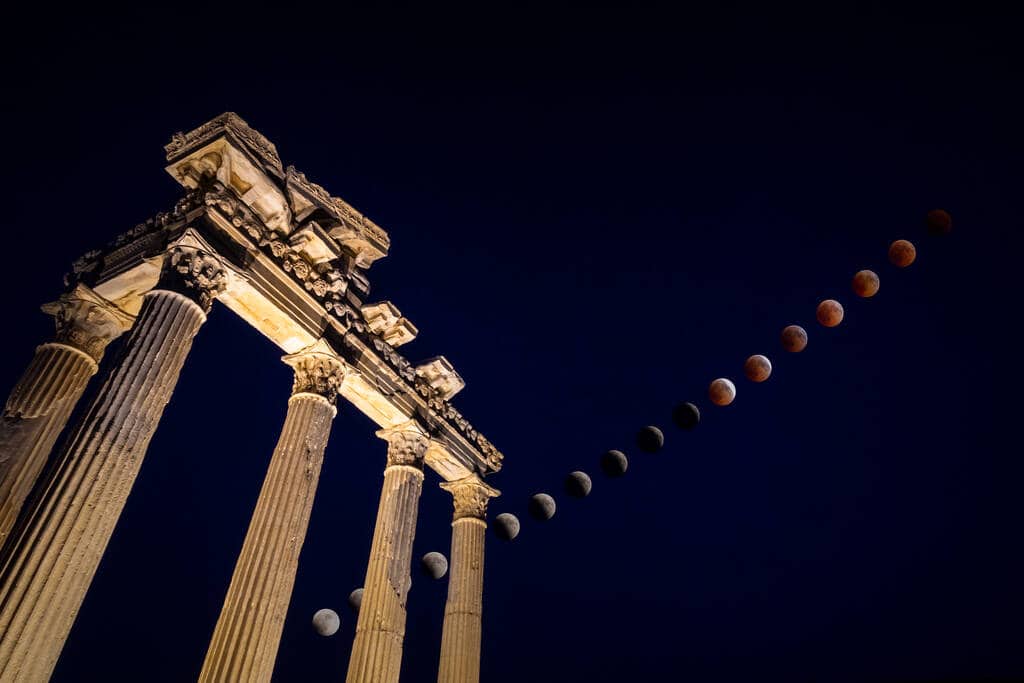From ancient omens to modern scientific revelations, solar and lunar eclipses have captivated humanity across cultures and eras.
These celestial events were interpreted as divine signs by early civilizations like the Babylonians and Chinese, who saw eclipses as messages from their gods or spirits.
Eclipses have also catalyzed major historical happenings, like the 585 BC eclipse that prompted a truce between warring kingdoms. In more recent centuries, eclipses played a pivotal role in validating Einstein’s theory of relativity and other breakthroughs in astronomy.
Even today, eclipses continue to fascinate people worldwide as rare opportunities to glimpse the cosmos. This article explores the enduring mystique and impact of eclipses throughout human history.
Solar Eclipse Quiz
Test your Solar Eclipse knowledge with these quick 5 fun multiple-choice questions, which offer a fascinating insight into the celestial ballet of the sun, moon, and Earth.

Ancient Beliefs and Interpretations
Ancient civilizations, such as the Chinese and Babylonians, interpreted solar and lunar eclipses as celestial messages, often attributing them to divine beings.
These ancient beliefs and interpretations played a significant role in shaping the historical significance of eclipses.
The ancient Chinese believed that during a solar eclipse, a mythical creature was devouring the Sun, and they’d create loud noises to scare it away.
Indigenous people in various cultures also had their own interpretations, viewing eclipses as battles between the Sun and Moon or as omens of impending disaster.
Interestingly, the Greek theory of general relativity, proposed by Aristotle, suggested that an eclipse was evidence that the Earth was round.
This theory, though not entirely correct, demonstrated the early understanding of the celestial phenomenon.
Eclipses have also influenced historical events.
For example, during the 585 B.C. eclipse, a ceasefire was declared between the Lydians and Medes, ending a long-standing war.
Even Christopher Columbus utilized a lunar eclipse in 1504 to negotiate with the locals, convincing them of his divine authority.
Understanding the ancient beliefs and interpretations of eclipses provides context for the historical significance they held and continues to shape our fascination with these celestial events.
Eclipses as Omens and Messages
The historical significance of eclipses extends beyond ancient beliefs and interpretations, as they’ve also been regarded as omens and messages throughout history.
Ancient civilizations, such as the ancient Chinese, believed that eclipses were messages from the heavens, indicating impending disasters or changes in the ruling dynasty.
The Greeks, on the other hand, saw eclipses as signs of divine intervention and often associated them with important historical events.
Eclipses have also played a role in scientific discoveries.
For example, during a solar eclipse in 1919, the verification of Einstein’s theory of General Relativity was made, revolutionizing our understanding of the universe.
Eclipses have been recorded in literature, such as Mark Twain’s ‘A Connecticut Yankee in King Arthur’s Court,’ where a recorded eclipse is used as a plot device.
These examples highlight the historical significance of eclipses as omens and messages throughout time.
Historical Events Influenced by Eclipses
Throughout history, eclipses have had a profound impact on various historical events.
Solar and lunar eclipses have fascinated civilizations since ancient times, leading to significant developments in science, culture, and religion.
For example, ancient Chinese astronomers carefully observed eclipses and believed they were caused by a dragon devouring the Sun or the Moon.
The ancient Greeks, on the other hand, saw eclipses as natural phenomena and used them to measure the Earth’s circumference.
In more recent history, the total solar eclipse of 1919 played a crucial role in confirming Einstein’s theory of general relativity.
Sir Arthur Eddington led an expedition to observe the eclipse, which provided evidence for the bending of light around the Sun, supporting Einstein’s revolutionary theory.
Eclipses continue to captivate humanity, reminding us of our place in history and the wonders of the cosmos.
Scientific Breakthroughs During Eclipses
As we shift our focus to the subtopic of ‘Scientific Breakthroughs During Eclipses’, let’s explore how these celestial events have paved the way for significant advancements in our understanding of the universe.
Solar eclipses, both lunar and total, have been observed and recorded throughout human history.
Ancient Chinese and Greek civilizations meticulously documented eclipse occurrences, contributing to our knowledge of celestial patterns.
These eclipse records provided a foundation for future scientific discoveries, including the validation of Einstein’s theory of general relativity.
In more recent times, the 2017 Total Solar Eclipse captured the attention of millions and involved multiple spacecraft and agency observations, furthering our understanding of the Earth, Moon, and Sun.
As we look ahead, upcoming solar eclipses in 2023 and 2024 will continue to provide opportunities for scientific exploration and education, captivating and inspiring people worldwide.
Cultural Impact and Legacy
Eclipses have left an indelible mark on human culture, shaping beliefs, influencing historical events, and sparking a sense of wonder and unity among people throughout history.
One example of the cultural impact of eclipses can be seen in ancient China, where people believed that solar eclipses were caused by a mythical creature trying to devour the Sun.
In the Chinese book ‘Chou Pei Suan Ching,’ solar eclipses were predicted and recorded.
Another example is the Megalithic Monument in County Meath, Ireland, where the people of the island welcomed the Moon’s shadow during a total solar eclipse visible from their location.
They took advantage of this celestial event to gather and celebrate, highlighting the cultural significance and fascination with eclipses that continues to this day.
Conclusion
Throughout the ages, eclipses have sparked awe, fear, celebration, and revelation across human civilization.
These fleeting celestial spectacles have profoundly shaped our history and culture, from ancient omens to scientific breakthroughs.
Even with our advanced understanding today, eclipses still carry profound meaning and unite us in a shared sense of wonder.
As rare glimpses of cosmic forces at play, eclipses remind us of our connectedness on this tiny planet.
Their legacy is a testament to humanity’s enduring fascination with the heavens and our quest to comprehend the mysteries of the universe.
Whenever the Moon blocks the Sun’s light, we are humbled by forces greater than ourselves, just as our ancestors were millennia ago.








